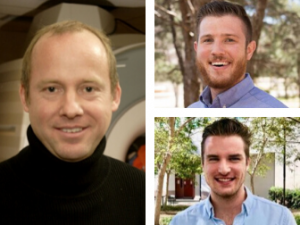Their paper titled Modality-specific effects of perceptual load in multimedia processing was presented to the Social Cognition Division at the 105th annual meeting of the National Communication Association, Baltimore, MD.
Abstract: Digital media are sensory-rich, multimodal, and often highly interactive. An extensive collection of theories and models within the field of media psychology assume the multimodal nature of media stimuli, yet there is current ambiguity as to the independent contributions of visual and auditory content to message complexity and to resource availability in the human processing system. In this manuscript, we argue that explicating the concepts of perceptual and cognitive load can create progress toward a deeper understanding of modality-specific effects in media processing. In addition, we report findings from an experiment showing that perceptual load leads to modality-specific reductions in resource availability, whereas cognitive load leads to a modality-general reduction in resource availability. We conclude with a brief discussion regarding the critical importance of separating modality-specific forms of load in an increasingly multisensory media environment.
Bios:
Professor Rene Weber (left) is the director of the department's Media Neuroscience Lab. His lab investigates complex cognitive responses to mass communication and mediated narratives with an emphasis on the neural mechanisms of moral conflict, persuasion, media violence, cognitive control, and flow experiences. Current projects focus on the relationships between media-multitasking and attention disorders (ADHD) and on the analysis of moral narratives and moral conflict in global news and entertainment. He was the first communication scholar to regularly use fMRI to investigate various media effects, from the impact of violence in video games to the effectiveness of anti-drug PSAs. He has published four books and more than 120 journal articles and book chapters (October, 2019). His research has been supported by grants from national scientific foundations in the United States and Germany, as well as through private philanthropies and industry contracts. He is a Fellow of the International Communication Association.
Jacob Fisher (top right) is a Communication graduate student at the University of California, Santa Barbara, a researcher in the Media Neuroscience Lab, and a trainee of the National Science Foundation IGERT in Network Science and Big Data. He researches multimedia processing and media multitasking from a network neuroscience perspective. His current work investigates how certain digital environments can modulate attentional networks in the brain, and how these modulatory effects can be harnessed to develop novel treatments for cognitive processing disorders like ADHD.
Frederic R. Hopp (bottom right) is a Ph.D. student in the Department of Communication, researcher at UCSB’s Media Neuroscience Lab, and an associate of the NSF IGERT Network Science Program. In his current research, he is applying a combination of state-of-the-art natural-language-processing and machine learning techniques to extract and classify the latent moral content permeating a variety of media narratives such as online newspaper articles or movie scripts. By combining these content analytical measures with neural responses arising from individuals’ perceptions of moral violations and moral conflicts, he is adopting a “brain-as-predictor” approach to better understand the underlying mechanisms driving large-scale behavioral outcomes, such as message virality and moral outrage, movie box office sales, or the spatio-temporal patterns of social unrest and protest movements. He has published his work in renown Communication journals and gave presentations at both academic, as well as commercial organizations, such as Sony Pictures.
Click the link below to read the full paper.







